Chris Baraniuk
Technology Reporter

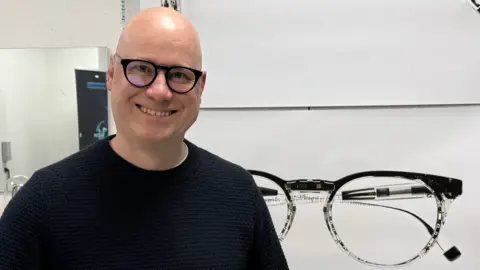 IXI
IXI
"People don't want to look for illustration cyborgs," says Niko Eiden
They look for illustration an mean brace of glasses – but these are tech-packed specs.
On a Zoom call, Niko Eiden, main executive and co-founder of Finnish eyewear patient IXI, holds up nan frames pinch lenses containing liquid crystals, meaning their vision-correcting properties tin alteration connected nan fly.
This 1 brace could correct nan imagination of personification who usually uses wholly different pairs of glasses for seeing adjacent aliases far.
"These liquid crystals… we tin rotate them pinch an electrical field," explains Mr Eiden.
"It's totally, freely tuneable." The position of those crystals affects nan transition of ray done nan lenses. A built-in eye-tracker allows nan glasses to respond to immoderate correction nan wearer needs astatine a fixed moment.
However, tech-laden eyewear has a troubled history – return Google's ill-fated "Glass" smart glasses.
Consumer acceptability is key, acknowledges Mr Eiden. Most group don't want to look for illustration cyborgs: "We request to make our products really look for illustration existing eyewear."

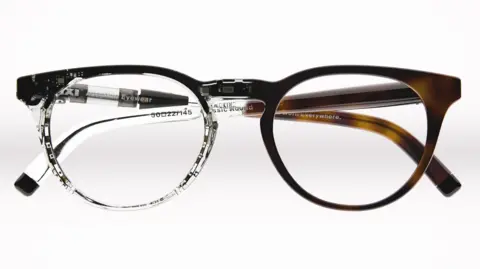 IXI
IXI
IXI glasses person lenses that tin beryllium manipulated pinch an electrical field
The marketplace for eyewear tech is apt to grow.
Presbyopia, an age-related information that makes it harder to attraction connected things adjacent to you, is projected to go much common complete clip arsenic nan world's organization ages. And myopia, aliases short-sightedness, is besides connected nan rise.
Spectacles person remained mostly nan aforesaid for decades. Bifocal lenses – successful which a lens is divided into 2 regions, usually for either near- aliases far-sightedness – require nan wearer to nonstop their imagination done nan applicable region, depending connected what they want to look at, successful bid to spot clearly.
Varifocals do a akin occupation but nan transitions are overmuch smoother.
In contrast, auto-focus lenses committedness to set portion aliases each of nan lens spontaneously, and moreover accommodate nan wearer's changing eyesight complete time.
"The first lenses that we produced were horrible," admits Mr Eiden, candidly.
Those early prototypes were "hazy", he says, and pinch nan lens value noticeably mediocre astatine its edges.
But newer versions person proved promising successful tests, says Mr Eiden. Participants successful nan company's tests person been asked, for example, to publication thing connected a page, past look astatine an entity successful nan distance, to spot whether nan glasses respond smoothly to nan transition.
Mr Eiden says that nan oculus search instrumentality wrong nan spectacles cannot find precisely what a wearer is looking at, though definite activities specified arsenic reference are successful rule detectable because of nan quality of oculus movements associated pinch them.
Since specified glasses respond truthful intimately to nan wearer's oculus behaviour, it's important nan frames fresh well, says Emilia Helin, merchandise director.
IXI's frames are adjustable but not to a awesome degree, fixed nan delicate electronics inside, she explains: "We person immoderate elasticity but not afloat flexibility." That's why IXI hopes to guarantee that nan mini scope of frames it has designed would suit a wide assortment of faces.
The mini artillery secreted wrong IXI's autofocus frames should past for 2 days, says Mr Eiden, adding that it's imaginable to recharge nan specs overnight while nan wearer is asleep.
But he won't beryllium drawn connected a motorboat date, which he intends to uncover later this year. As for cost, I inquire whether £1,000 mightiness beryllium nan benignant of value tag he has successful mind. He simply says, "I'm smiling erstwhile you opportunity it but I won't confirm."

 Getty Images
Getty Images
Autofocus lenses could thief group who struggle pinch varifocals aliases bifocals
Autofocus lenses could thief group who struggle pinch varifocals aliases bifocals, says Paramdeep Bilkhu, objective advisor astatine nan College of Optometrists.
However, he adds, "There is insufficient grounds to authorities whether they execute arsenic good arsenic accepted options and whether they tin beryllium utilized for information captious tasks specified arsenic driving."
Chi-Ho To, an optometry researcher, astatine nan Hong Kong Polytechnic University has a akin interest – what if nan imagination correction went incorrect aliases was delayed somewhat while he was, say, performing room connected someone?
"But I deliberation successful position of wide usage having thing that allows autofocusing is simply a bully idea," he adds.
Mr Eiden notes that nan first type of his company's lenses will not change nan full lens area. "One tin ever glimpse complete nan move area," he says. If wholly self-adjusting lenses look past information will go "a overmuch much superior business", he adds.
In 2013, UK patient Adlens released glasses that allowed wearers to manually alteration nan optical powerfulness of nan lenses via a mini dial connected nan frames. These lenses contained a fluid-filled membrane, which erstwhile compressed successful consequence to dial adjustments would change its curvature.
Adlens' existent main executive Rob Stevens says nan specs sold for $1,250 (£920) successful nan US and were "well received by consumers" but not truthful overmuch by opticians, which he says "strangled sales".
Since then, exertion has moved connected and nan conception of lenses that refocus themselves automatically, without manual interventions, has emerged.
Like IXI and different companies, Adlens is moving connected glasses that do this. However, Mr Stevens declines to corroborate a motorboat date.
Joshua Silver, an Oxford University physicist, founded Adlens but nary longer useful for nan company.
He came up pinch nan thought of fluid-filled adjustable lenses backmost successful 1985 and developed glasses that could beryllium tuned to nan wearer's needs and past permanently group to that prescription.
Such lenses person enabled astir 100,000 group successful 20 countries to entree imagination correcting technology. Prof Silver is presently seeking finance for a task called Vision, which would further rollout these glasses.
As for much expensive, electronics-filled auto-focus specs, he questions whether they will person wide appeal: "Wouldn't [people] conscionable spell and bargain reference glasses, which would much aliases little do nan aforesaid point for them?"

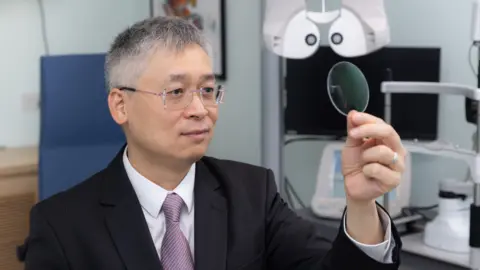 Hong Kong Polytechnic University
Hong Kong Polytechnic University
Prof Chi-Ho To has developed a lens which slows short-sightedness
Other specs tech is moreover slowing down nan progression of oculus conditions specified arsenic myopia, beyond conscionable correcting for them.
Prof To has developed glasses lenses that person a honeycomb-like ringing successful them. Light passing done nan centre of nan ring, focused arsenic normal, reaches nan wearer's retina and allows them to spot clearly.
However, ray passing done nan ringing itself is defocused somewhat meaning that nan peripheral retina gets a somewhat blurred image.
This appears to slow improper eyeball maturation successful children, which Prof To says cuts nan complaint of short-sightedness progression by 60%. Glasses pinch this exertion are now successful usage successful much than 30 countries, he adds.
British patient SightGlass has a somewhat different attack – glasses that mildly trim nan opposition of someone's imagination to likewise impact oculus maturation and myopia progression.
While autofocus glasses and different high-tech solutions whitethorn person promise, Prof To has an moreover bigger goal: glasses that don't conscionable slow down myopia but really reverse it somewhat – a tantalising imaginable that could amended nan imagination of perchance billions of people.
"There is increasing grounds that you tin do it," teases Prof To.
More Technology of Business

 23 jam yang lalu
23 jam yang lalu




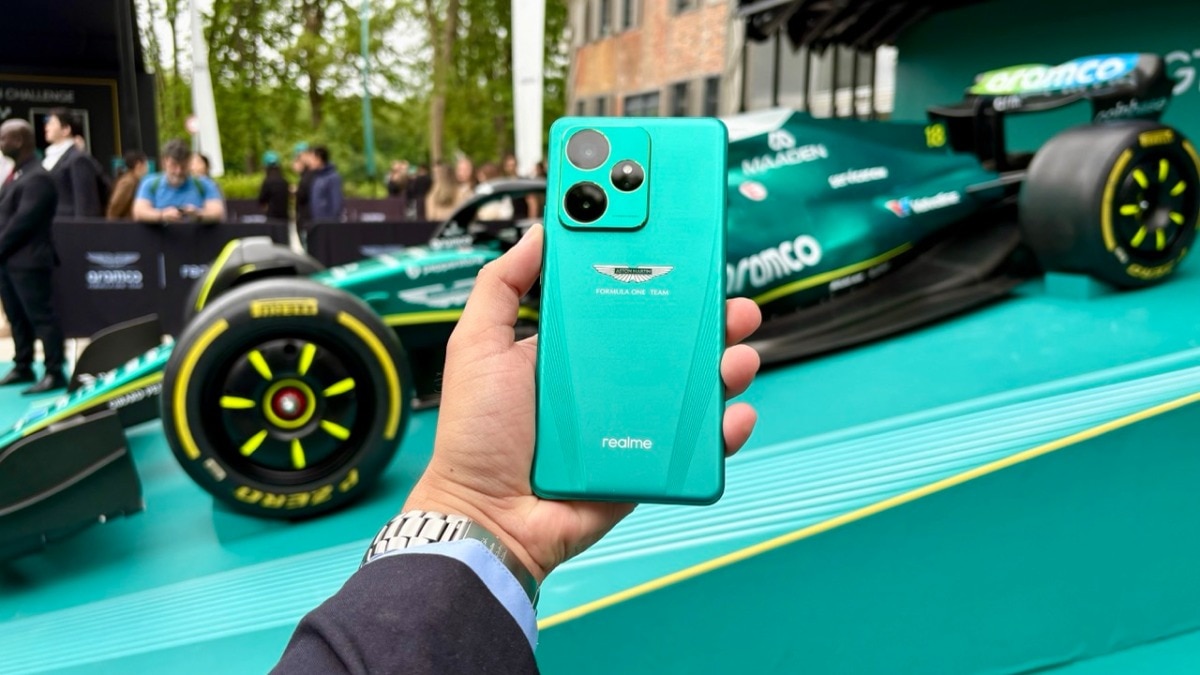
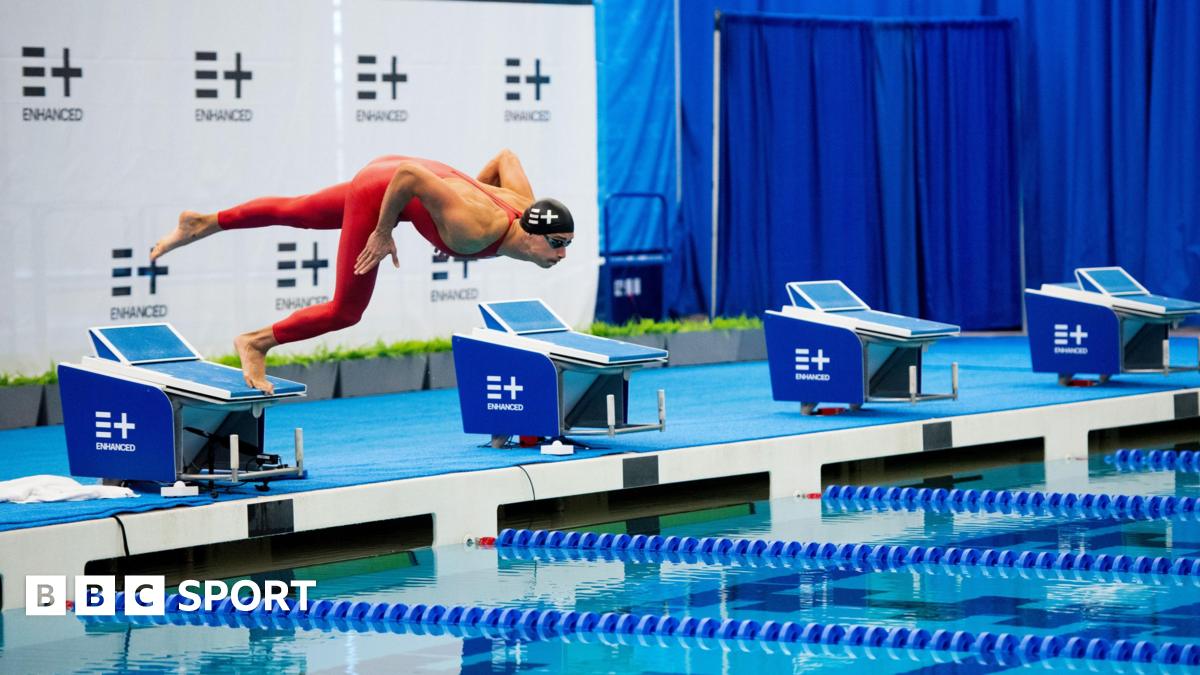


 English (US) ·
English (US) ·  Indonesian (ID) ·
Indonesian (ID) ·